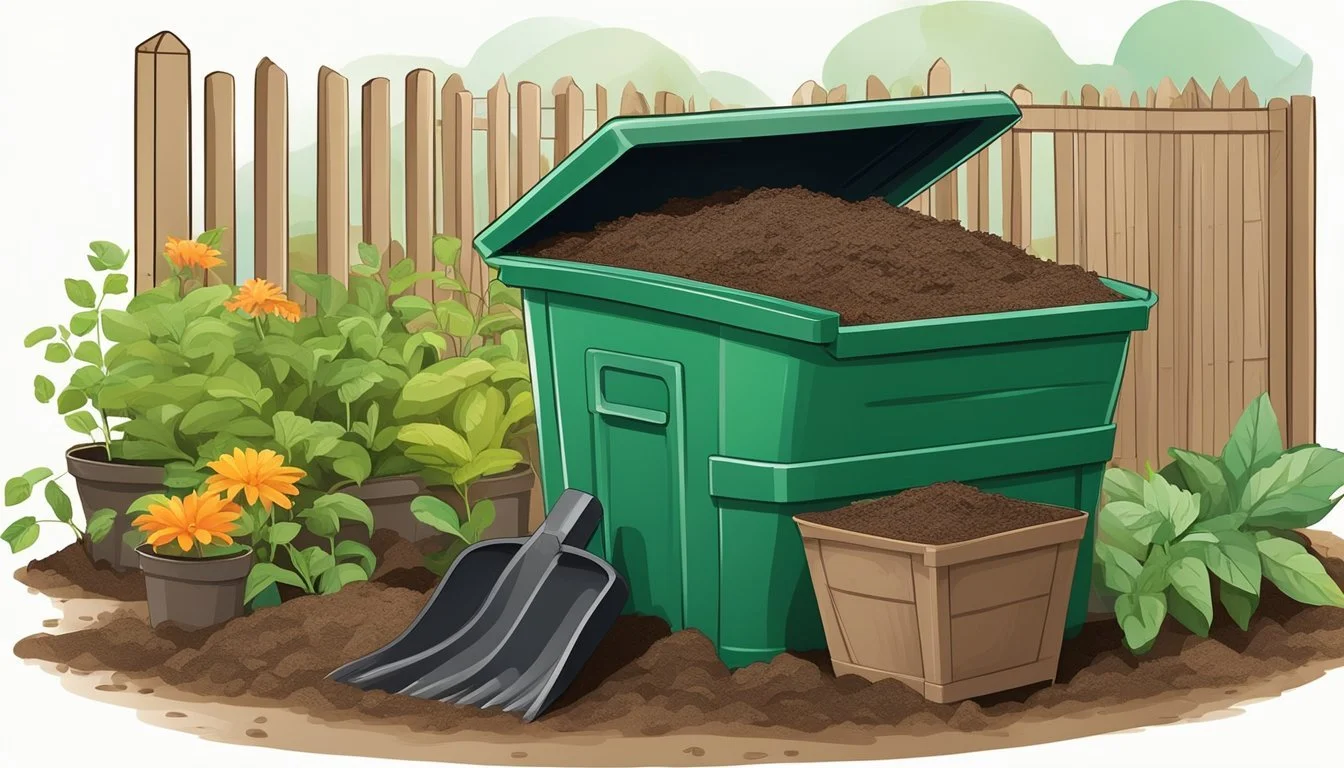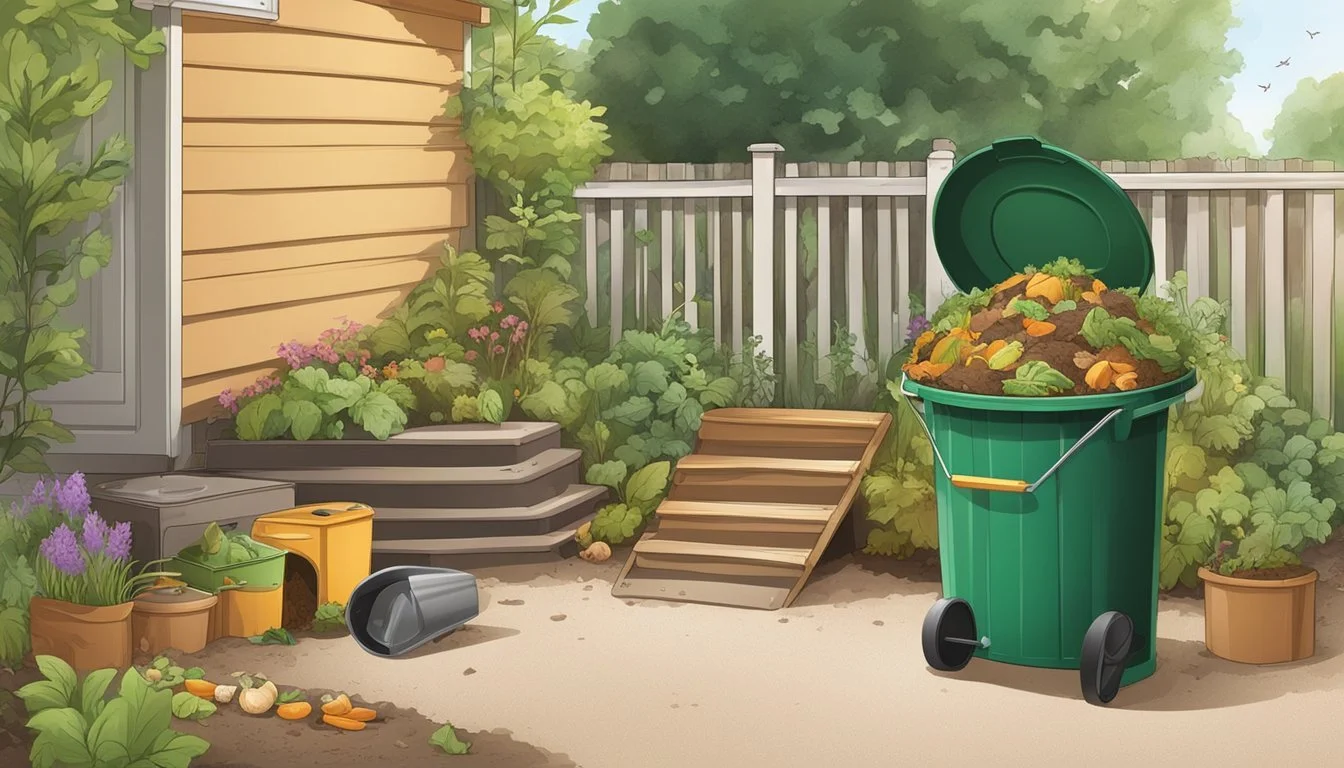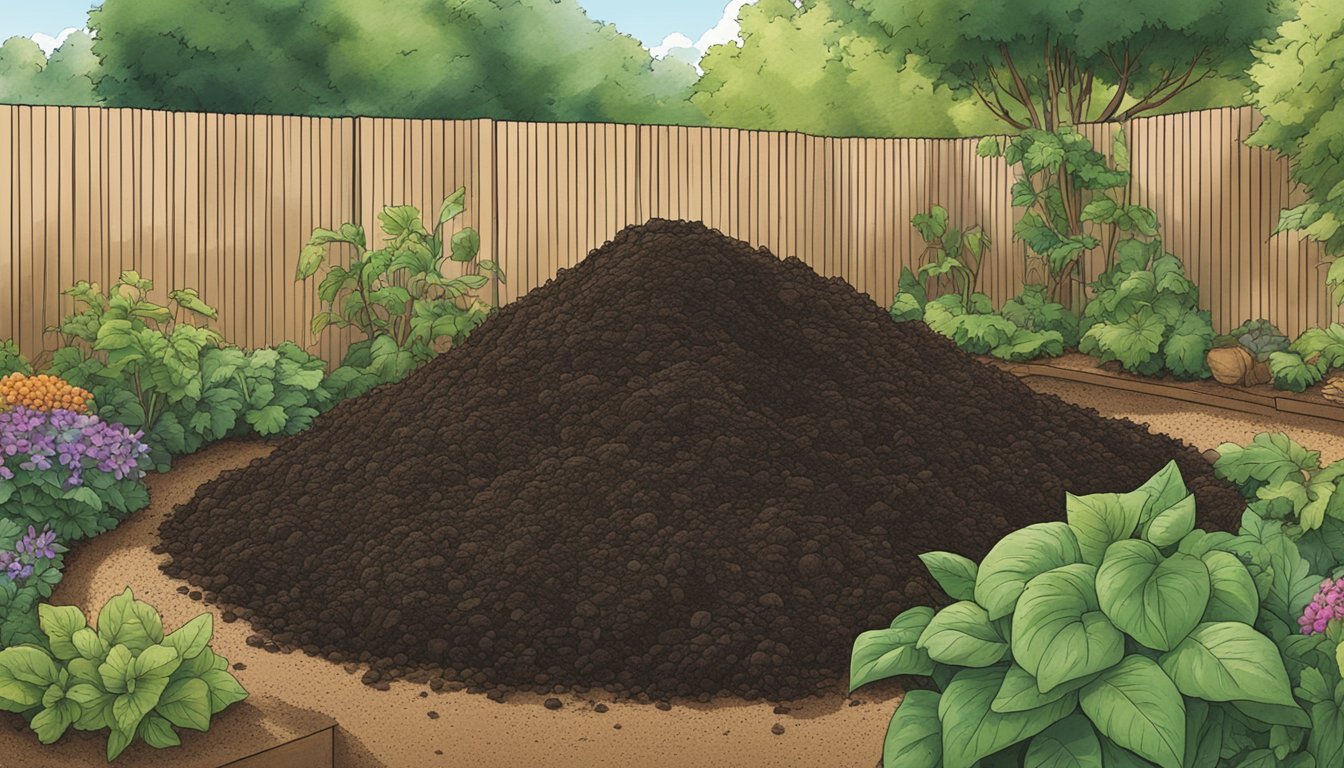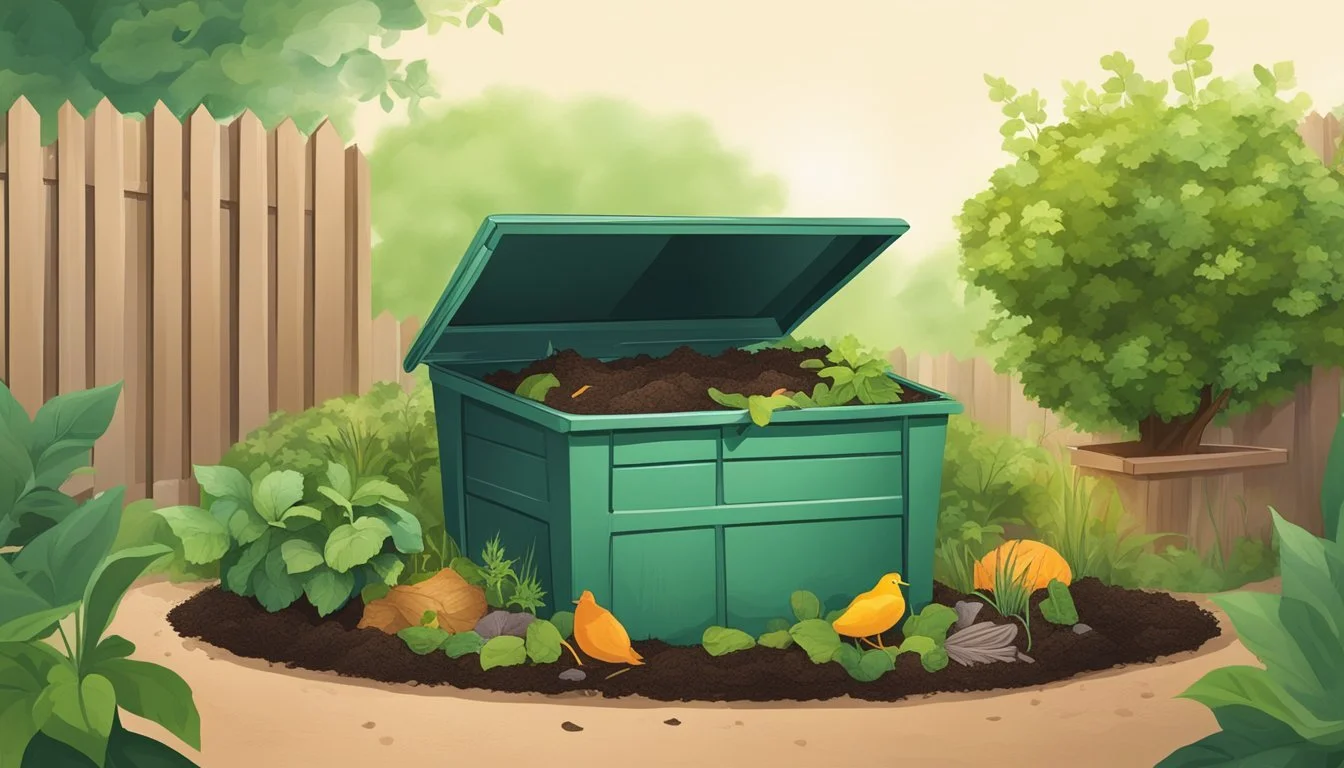Guide to Composting in Allen, TX
Tips for Eco-Friendly Waste Reduction
Composting is an eco-friendly practice that transforms organic waste into a nutrient-rich amendment for the soil, benefiting both home gardens and the environment at large. In Allen, Texas, this method of recycling kitchen scraps and yard waste has gained traction, with the city providing residents support and guidance to make composting a successful venture. It involves collecting appropriate organic materials, such as leaves, vegetable scraps, and paper products, and encouraging their breakdown into a substance that enhances soil quality and plant growth.
Residents of Allen can start a compost pile in their own backyard, creating a sustainable way to contribute to waste reduction while providing their gardens with a steady supply of compost. The ideal dimensions for a compost pile are 3 feet by 3 feet, which allows it to attain the proper temperatures needed to decompose materials efficiently without becoming unmanageable.
The utilization of the finished compost is also straightforward, offering several benefits for local gardening. Compost can be mixed into the soil to improve its structure, water retention, and nutrient content, or used as mulch to help preserve soil moisture and discourage weeds. In Allen, they recognize the practice of composting as a simple yet impactful step towards a greener future, providing the community with both educational resources and access to compost materials, ensuring this environmentally friendly approach is well within the reach of all.
Composting Basics
Composting is an effective method for recycling organic materials to enrich soil health and support the environment. This guidance encapsulates the fundamentals of composting, delineating what it is and the myriad benefits it offers.
What is Composting?
Composting is the natural process of recycling decomposed organic materials into a rich soil-like material called compost. It involves the controlled aerobic decomposition of organic waste materials, transforming them into a valuable amendment for soil. The process requires a balanced mix of 'greens' (nitrogen-rich materials such as food scraps and grass clippings) and 'browns' (carbon-rich materials such as leaves and twigs), water, and air.
Benefits of Composting
Environmental Impact: Composting significantly reduces the volume of waste that would otherwise end up in landfills. By turning kitchen scraps and yard waste into compost, one effectively recycles such materials, thereby minimizing their environmental footprint.
Soil Enrichment: Compost is teeming with essential nutrients that soils crave. When incorporated into garden soil, compost improves soil structure, enhances moisture retention, and provides plants with a steady supply of nutrients. It serves as a natural soil conditioner, fostering healthier plant growth and higher yields.
Setting Up Your Compost Area
Setting up a compost area is an efficient way to recycle organic waste into rich soil for your Allen, TX garden. Strategic placement and choosing the appropriate system are crucial to the success of your composting efforts.
Choosing the Right Location
The ideal location for a compost area in your backyard will have well-drained soil and partial sunlight. Ensure the spot is easily accessible year-round and at a reasonable distance from your home to avoid any potential odor issues. Consider convenience for adding materials to your compost heap, as well as accessibility for turning the pile.
Types of Composting Systems
Compost Pile: A simple mound where green and brown materials are layered is the most basic system, requiring no additional structures.
Compost Bin: Commercially available compost bins can contain your compost in a tidy manner, with features that ease the process, like built-in aerators.
Tumbler: A tumbler speeds up the composting process with its capacity to turn materials easily, providing quick aeration and facilitating faster decomposition.
Choose the system that fits your garden size and the amount of waste generated.
Constructing Your Compost Pile or Bin
When constructing your compost pile, follow these steps:
Start with a layer of twigs or straw at the bottom for aeration.
Add alternating layers of 'greens' (kitchen scraps, fresh grass clippings) and 'browns' (dried leaves, cardboard).
Ensure the top layer is 'browns' to prevent odors and pests.
For those opting for a compost bin:
Commercial bins often come with instructions. Follow them closely to ensure proper assembly and placement.
For homemade bins, use materials like chicken wire, pallets, or lumber, and remember to allow for air circulation and easy access for turning the compost.
Whichever method you choose, a balanced approach to layering and maintaining your compost will lead to successful decomposition and valuable soil for your Allen, TX garden.
Ingredients for Composting
Successful composting in Allen, TX, hinges on balancing two types of materials, known as "greens" and "browns," to create a nutrient-rich, soil-improving compost.
Greens and Browns
Greens are nitrogen-rich materials that include items such as:
Vegetable and fruit scraps
Coffee grounds
Fresh grass clippings
Eggshells
Plant trimmings
Greens help to heat up the compost pile and speed the decomposition process.
Browns are carbon-rich materials, which contribute to the structure and aeration of the compost, and they include:
Dry leaves
Straw
Woody prunings
Cardboard (unwaxed)
Shredded newspaper
Napkins and paper towels (unbleached)
Sawdust and wood chips
It's important to maintain a good balance between these two types of materials, usually aiming for a ratio of about 3:1, browns to greens, by volume.
Materials to Exclude
While many organic materials are compostable, certain items should be left out of the compost bin to prevent odors, pests, and potential health hazards. These include:
Meat or seafood scraps
Dairy products
Fats and oils
Pasta
Diseased plants
Pet wastes
Adding water in appropriate amounts is essential as well, as moisture helps to break down the composting materials, but it's crucial to avoid excess water which can lead to a smelly compost pile.
Maintaining Your Compost
Proper maintenance of a compost pile is crucial for transforming organic waste into a nutrient-rich amendment for plants. This process requires attention to the balance of components, adequate aeration, temperature control, and proper moisture levels.
Balancing Components
To maintain a healthy compost pile, one should aim for a balance of 'greens' and 'browns'. Greens are nitrogen-rich materials like vegetable scraps, while browns provide carbon and include items like dry leaves. A general guideline is to use a 1:3 ratio of greens to browns. This balance helps to nourish the microorganisms, such as bacteria and fungi which are essential for decomposition.
Aeration and Temperature Control
Oxygen is vital for microorganisms to thrive and break down organic material. Therefore, regular turning of the compost pile ensures even aeration and promotes faster decomposition. A well-aerated pile reaches higher temperatures, often between 130°F to 150°F, which not only speeds up the process but also helps to kill pathogens and weed seeds.
Moisture and Decomposition
The pile should be as moist as a wrung-out sponge to optimize decomposition. Overly wet conditions can create anaerobic pockets and slow down the process, while too dry an environment can halt decomposition altogether. The pile's moisture can be checked manually, and water should be added or regulated to maintain this ideal level, facilitating the breakdown of organic material into nutrient-rich compost for plants.
Utilizing Finished Compost
Utilizing finished compost is a crucial step for any gardener in Allen, TX looking to enrich their soil and promote plant health. Knowing when compost is ready to use and how to apply it effectively can greatly enhance a garden's productivity.
When is Compost Ready?
Finished compost is ready for use when it has become dark, crumbly, and has an earthy smell without the scent of ammonia. Identifying complete compost involves ensuring that the original organic materials are no longer recognizable and the pile has cooled down. Materials from the center should have been moved to the outside to facilitate even decomposition. The decomposition process can typically take anywhere from one month to six months depending on the turning frequency and conditions.
Applying to Gardens and Lawns
When incorporating finished compost into gardens and lawns, one should distribute it evenly over the soil surface. In gardens, it can be used as a soil amendment by mixing a few inches of compost into the top layer of garden soil. This enhances soil structure, provides nutrients, and improves water retention. For lawns, compost can serve as a nutritious mulch. Thin layers of about 1/4 to 1/2 inch applied in the spring or fall can improve lawn health and soil quality. In both cases, using compost helps to further establish a sustainable and thriving ecosystem that supports robust plant growth.
Troubleshooting Common Issues
In the composting process, encountering issues such as odors, pests, slow decomposition, and an imbalanced mix can be common. Understanding these problems and knowing how to address them can enhance the overall efficiency and effectiveness of a compost pile.
Odors and Pests
Odors are often an indication of a lack of oxygen or too much moisture in a compost pile, which can attract pests. To remedy foul smells, one should turn the pile to improve oxygen flow and add dry materials, such as leaves or straw, to reduce moisture. For insect control, ensure that all kitchen scraps are well-covered by soil or brown materials and use a pest-reducing mesh to safeguard the pile.
Slow Decomposition
When materials in a compost pile are breaking down slower than expected, it's often due to temperature imbalances or insufficient nitrogen. The pile should be maintained at an optimal temperature and mixed regularly to distribute heat evenly. Introducing a nitrogen source like fresh grass clippings can accelerate the composting process, as nitrogen is crucial for the growth of micro-organisms that break down organic matter.
Imbalanced Compost Mix
A healthy compost pile requires a balance between greens (nitrogen-rich materials) and browns (carbon-rich materials). If the compost is too wet, it likely has too many greens, and adding browns like shredded newspaper can help. Conversely, if the pile is too dry, incorporating more greens will introduce the necessary moisture and nitrogen for the micro-organisms to thrive.
Composting in Allen, TX
Residential and commercial sectors in Allen, TX, demonstrate a growing commitment to sustainability through composting. Efforts to reduce organic waste align with the city's aspiration to achieve a zero-waste goal.
Local Guidelines and Initiatives
Allen's city ordinances encourage residents to partake in composting practices. Yard debris, including leaves and grass clippings, can be transformed into nutrient-rich compost for landscaping and gardening purposes. This practice is in line with the community's zero-waste initiative, aiming to minimize landfill use by maximizing recycling and composting. Residents are guided on how to balance green (nitrogen-rich) and brown (carbon-rich) materials in their compost bins to accelerate the decomposition process.
Community and Commercial Composting
In Allen community gardens, composting serves as a crucial tool for soil management and waste reduction. Participation in these communal sites fosters environmental stewardship and facilitates the exchange of composting knowledge. On a larger scale, regional commercial composting facilities manage significant volumes of organic waste, processing materials from local businesses and providing compost for commercial use. These operations contribute to Allen's sustainability goals and aid in the city's pursuit of facilitating a robust, community-wide composting system.
Advanced Composting Techniques
In Allen, TX, gardeners can elevate their composting game with specialized methods that facilitate faster decomposition and nutrient enrichment. Techniques such as vermicomposting and Bokashi composting are ideal for handling kitchen and vegetable scraps, offering efficient breakdown and soil enhancement.
Vermicomposting
Vermicomposting uses the unique digestive processes of worms to accelerate organic waste decomposition. Red wiggler worms are typically employed to convert materials like vegetable scraps, fruit waste, and natural fibers into high-quality vermicast. This byproduct is a potent, nutrient-dense compost that plants thrive on. Allen residents can maintain a vermicomposting system indoors or outdoors, providing adequate bedding, such as shredded newspaper or cardboard, to create a thriving habitat for the worms.
Benefits:
Fast decomposition
Can be done indoors
Materials Suitable for Vermicomposting:
Vegetable scraps
Coffee grounds
Eggshells
Natural fibers (e.g., cotton)
Bokashi Composting
Bokashi composting, stemming from Japanese practices, is a fermentation-based method that can handle kitchen leftovers, including meat and dairy—unlike traditional composting. This process requires the layering of scraps with Bokashi bran in an airtight container to promote fermentation. Generated pre-compost can then be buried in garden soil to finish decomposition, ultimately enriching the land with beneficial microorganisms.
Steps:
Layer kitchen scraps with Bokashi bran
Seal in an airtight container
Allow fermentation (2 weeks)
Bury pre-compost in garden soil
The techniques highlighted provide Allen gardening enthusiasts with powerful tools to manage organic waste and contribute to a healthier ecosystem.
Eco-Friendly Practices Beyond Composting
While composting is a key element in Allen's sustainability efforts, residents can adopt further eco-friendly practices to minimize environmental impact. These actions not only contribute to a healthier planet but also support Allen in achieving its zero waste goal.
Reducing Food Waste
One of the most effective strategies for reducing one's environmental footprint involves minimizing food waste. Residents can take simple measures like planning meals to avoid excess, using a reusable container for leftovers, and learning to properly freeze food to extend its lifespan. By doing so, they actively decrease the amount of waste sent to landfills, thereby conserving valuable resources and reducing greenhouse gas emissions.
Sustainable Yard Care
In addition to food waste reduction, sustainable yard care plays a crucial role in environmentally responsible living. Homeowners are encouraged to employ practices such as mulching and xeriscaping to conserve water, as well as choosing native plants that require less maintenance and are more resistant to local pests. Allen supports these initiatives by providing free compost for soil enrichment, thus promoting a cycle of natural, chemical-free growth and sustainability.










